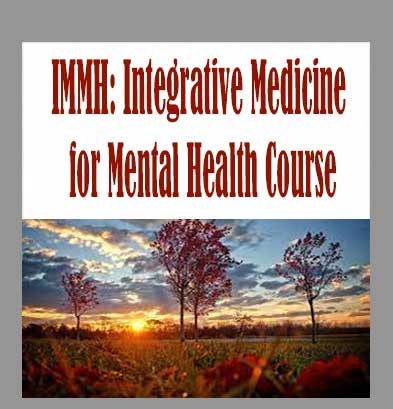
Description
IMMH: Integrative Medicine for Mental Health Course: Exploring Nutrition, Mind-Gut Connection, Hormones, Toxins, and more! download , IMMH: Integrative Medicine for Mental Health Course: Exploring Nutrition, Mind-Gut Connection, Hormones, Toxins, and more! review , IMMH: Integrative Medicine for Mental Health Course: Exploring Nutrition, Mind-Gut Connection, Hormones, Toxins, and more! free
IMMH: Integrative Medicine for Mental Health Course: Exploring Nutrition, Mind-Gut Connection, Hormones, Toxins, and more!
All too often, established medical models treat mental health conditions with therapy and medication, leaving many patients with residual symptoms, unpleasant side effects, and relapse.
And now more than ever, pioneering practitioners, like you, are rethinking this perspective… looking at the underlying issues that lead to mental health conditions… and taking a new approach. And you are not alone!
Clinicians are turning to integrative and functional medicine — which looks for and treats the root cause of the problem… such as hormone imbalance, toxin exposure, inflammation, gut microbiome, and more.
And the results are revolutionizing the field of mental health and providing patients with sustainable results. It offers hope and healing for some of the most complex and difficult-to-treat mental health conditions from anxiety to depression to ADHD.
Register now for the Integrative Medicine for Mental Health online course and discover what the latest advances in this emerging field mean for your patients and your practice.
When you register, you will get…
- New insights into the underlying biochemical factors that contribute to mental illness… including depression, anxiety, eating disorders, and more
- An understanding of how to harness the psychological connection to improve health
- The latest evidence about the mind, gut, and body connection and its impacts on mental health
- Strategies to incorporate integrative medicine into a variety of clinical settings
- Simple tools for developing personalized patient treatment plans using labs and diagnostics
- Tools to harness the power of nutrition to treat mental health conditions
- New evidence on how toxins including mold, pesticides, and heavy metals can impact mental health and what you can do about it
During this comprehensive course, you’ll get expert guidance from 18 of the most renowned and pioneering doctors, scientists, and health practitioners in the field. They’ll share the latest evidence and best practices in integrative and functional medicine so you can empower your patients with treatments that address the root causes of their conditions.
Get the latest information, skills, and tools to provide holistic and effective mental health care.
With a focus on the root cause, personalization, and precision, integrative medicine delivers unique, actionable, cutting-edge, and evidence-based information so that forward-thinking practitioners can offer more hope and better healing to their patients.
WHY THIS TRAINING STANDS OUT FROM OTHERS!
- Rooted in a deep history of integrative medicine for mental health (IMMH) and known for its excellence
- Developed to meet the real-world needs of practitioners who care for patients of all ages with mental health conditions
- A unique approach that combines psychological and biochemical treatment options for better patient outcomes
- Led by 18 world-renowned integrative medicine and mental health practitioners… Greenblatt, Shaw, Pizzorno, Lustig, Toups, and more!
- Guidelines to address hormones, inflammation, food, toxins, and more!
- Powerful integrative medicine strategies you can immediately apply in your practice
Designed for: Physicians, Nurse Practitioners, Psychiatrists, Psychologists, Physician Assistants, Nurses, and other medical and mental health providers
See the below outline and learn about our IMMH expert speakers!
The Impact of Trauma on Mental and Physical Health through the Lens of the Polyvagal Theory: Predictable Consequences of a Dysregulated Nervous System
Stephen Porges, PhD
Polyvagal Theory
- Theoretical basis for a neuroscience of safety
- Safety promotes spontaneous social engagement behaviors and health, growth, and restoration
Principles
- Autonomic state functions as an intervening variable
- Three neural circuits form a phylogenetically ordered response hierarchy that regulate autonomic state adaptation to safe, dangerous, and life-threatening environments
- In response to a challenge, the ANS shifts to states regulated by circuits that evolved earlier consistent with the Jacksonian principle of dissolution [30], a guiding principle in neurology
- Ventral migration of cardioinhibitory neurons leads to an integrated brainstem circuit (ventral vagal complex) that enables the coordination of suck-swallow-breath-vocalize, a circuit that forms the neurophysiological substrate for an integrated social engagement system
- Neuroception: Reflexive detection of risk triggers adaptive autonomic state to optimize survival
Application
- What does this mean in practice?
- Applying in trauma care
Brains of Fire: Current State of Mental Health and Integrative Treatments for Anxiety and Depression
Mary Beth Ackerley MD, MD(H), ABIHM
Current Status — Depression/Anxiety
- Oversimplified Diagnosis — what we know
- SSRI Usage
- COVID Impact
Role of Neuroinflammation
- Causes of Chronic Inflammation
- CIRS vs Neuropsychiatric Syndromes
- Medical Gaslighting
Biotoxins and Neuropsychiatric Illness
- Cognitive Decline
- Inflammatory Cytokines
- Microglia Activation
- Suicide
Treatment Approaches
- Simple Treatments — Anxiety, Depression, Insomnia
- MCAS Supplements
- Bodywork Approaches
Functional Medicine Psychiatry for Depression, Anxiety, and other Mental Health Disorders
Achina Stein, DO, DFAPA, ABIHM, IFMCP, FACN
- Comparison of conventional medicine and functional medicine
-
- Standard psychiatric care, bloodwork ordered and siloing of treatment
- Acute care model/silver bullet approach
- Contrasted to functional assessment and care and testing ordered — chronic disease approach
- Functional medicine: who is for and who is it not for
- Areas of assessment and treatment overlooked and challenges of the conventional physician
- Primary root cause of chronic disease is inflammation
- How inflammation causes depression
- Creating a timeline of the patient’s history
- MSQ form for tracking clinically/PROMIS for research
- rThe gut-brain connection:
- Brain Immune Gut connection: BDNF
- Zonulin, LPS and increased gut permeability
- Vagus nerve
- The functional medicine approach
- Digestion
- Four main root causes — foods, infections, toxins and stress and how to address each area
- 5Rs of gut restoration — remove, replace, re-inoculate, repair and rebalance and what specifically to do
The Role of Thyroid Hormones and Thyroid Autoimmunity in Mental Health
Izabella Wentz, PharmD
What’s going on in autoimmune thyroid disease?
- Thyroid hormone status
- Autoimmunity
- Consequences of dysthyroidism/triggers/exacerbating factors of AITD
- Symptom Overlap
- What is a “full thyroid panel”?
Role of thyroid hormone status (hypothyroidism/hyperthyroidism) in mood disorders and anxiety
- Subtreatment as cause for residual symptoms
- How to optimize thyroid hormones
-
- TSH
- T4 to T3 conversion… pharmaceutical options, co-factors
Clinical relevance of thyroid autoimmunity in mental health disorders
- Discussion of pertinent research and proposed mechanisms
- Strategies for balancing autoimmune response…myo-inositol, selenium, LLLT, NAC
Consequences of dysthyroidism/autoimmune triggers in relation to mental health
- Stress response
- Strategies for balancing autoimmune response…myo-inositol, selenium, LLLT, NAC
Consequences of dysthyroidism/autoimmune triggers in relation to mental health
- Stress response
-
- Blood sugar
- Trauma
- Nutrient deficiencies
- Low ferritin
- Low Vitamin D
- Methylation
- B12
- Infections, gut health and toxins
Potential protocols to support thyroid and mental health symptoms
Dopamine Fasting: An Early Intervention for Compulsive Overconsumption in the Digital Age
Anna Lembke, MD
The Pleasure-Pain Balance: How It Works
- Pleasure Seeking
- Pain Avoidance
- Finding Balance
The Plenty Paradox
- Primitive Wiring
- Modern Ecosystem
- How to Deal with the Mismatch
Helping Your Patients Figure out What to Do About It
- Abstain
- Maintain
- Seek out Pain
Mental Health is Metabolic Health of the Brain
Robert Lustig, MD, MSL
Increasing metabolic and mental health crises around the world
- Diseases of metabolic syndrome, diabetes, CVD, cancer, dementia
- Diseases of despair — addiction, drug use, depression
- Overlap between metabolic and mental health disorders – could these be linked?
Does unhappiness lead to early mortality?
- Unhappiness does not reduce lifespan
- What we do to “get happy” reduces lifespan
- Things that increase dopamine increase both metabolic and mental dysfunction
Mechanisms that worsen both metabolic and mental health
- Mitochondrial energetics and ATP availability inhibited by fructose
- Neurotransmitter cycling, esp. glutamine synthase inhibited by fructose
- Trophic factors, including leptin and BDNF; blockage by insulin
- Gut inflammation due to changes in the microbiome
Improving both metabolic and mental health through nutrition
- Protect the liver
- Feed the gut
- Support the brain
The Next Frontier in Healing the Brain: Beyond Functional Medicine
Robert Hedaya, MD, DLFAPA, ABPN, IFMCP
HYLANE
- HYperBaric Oxygen Therapy (HBOT)
- LAser
- NEural Exercise
- Pascal…How is her brain…Improvement after HYLANE
- qEEG, HBOT, Laser, KETAMINE ASSISTED THERAPY…mechanisms of action, including thalamus
Antagonists
- NMDA/Glutamate antagonist
- Kappa-opioid mixed antagonist/agonist
- Nicotinic acid antagonist
- D2-antagonist
Other symptoms/changes
- Neuroplasticity
- Synaptogenesis: MPFC and hippocampus; increased dendritic spines
- Thalamic regulation; PTSD/Movement disorders
Literature overview
- Laser
- HBOT
- Ketamine
- NFB
Cases:
- Shmuel B: mood charts-Laser; Aphasia (Bower), Visual: Jang/King
- Folio-Ketamine-pre-post
- Morris/others-Ketamine-right left shift
- OCD: NFB-Tankel
- HBOT: Bleiler
Awareness is Not Enough: A New Look at the Staggering Statistics of Adolescent Mental Health
James M. Greenblatt, MD
The American Youth in Crisis
- Popular Media
- Prevention Paradigm
- Functional Psychiatry — Expanding and Enhancing the Paradigm
- Genetics
PANS/PANDAS
- Introduction, review of common symptoms, etiology, and pathogenesis
- Neuropsychiatric signs and symptoms
- Implications of misdiagnosis, relevance to pediatric psychiatry
- Testing
- Strengths and limitations of the research
Celiac Disease
- Introduction, review of common symptoms, etiology, and pathogenesis
- Implications of misdiagnosis and lack of treatment
- Testing
Nutrition and Ultra-Processed Food
- The laws of human nutrition: you are what you eat/you are what you don’t eat
- Rate of consumption in American youth
- Exploring research showing robust correlations with adverse mental health outcomes
- Strength and limitations of the research
- Implications for clinical practice
Vitamins
- Vitamin D
- Zinc
- Magnesium
- “Vitamin S”: Sleep
Biochemical Individuality
- Limitations of “one size fits all” models
- How biochemical individuality can inform a novel paradigm for treatment and prevention
An Integrative Approach to Mental Health: Where The Body Meets The Mind
Arwen Podesta, MD
Joe Mather, MD
What is collaborative medicine?
- Integrative vs collaborative vs “transdisciplinary”
- What tools needed to integrate
- Why integrate/collaborate with mental health (“comorbidities”)
Causes, workup and treatment of common mental health problems
- ADHD
- Anxiety
- Depression
- Insomnia
- Fatigue
Common missteps in integrative mental health care
- Overtreatment of thyroid
- Aggressive elimination diets
- Overprescription of medications (SSRI, benzos)
Pillars of some effective treatment of common mental health symptoms
- Gut
- Nutrition and diet
- Gut health
- Inflammation
- Methylation
- Nicotinamide adenine dinucleotide (NAD)
PANS/PANDAS: The Role of Infection and Toxin-Mediated Neuroinflammation in Mental Health Disorders
Scott Antoine, DO, FACEP, ABOIM
The History and Science Behind PANS and PANDAS
- Definitions of PANS and PANDAS
- Molecular Mimicry as a Causative Factor in Autoimmunity
- Anti-neuronal Antibodies in PANS and PANDAS
- Radiographic and Experimental Evidence of Basal Ganglia Pathology in PANS/PANDAS Patients
- Origins of the Controversy Surrounding PANS and PANDAS and Evidence-based Medicine
Diagnosing PANS and PANDAS
- Classic Criteria
- A Detailed Description of Symptoms and Physical Exam Findings
- The Role of Laboratory and Radiology Testing in PANS and PANDAS
- Specific Testing Performed in Patients with PANS and PANDAS
- The Importance of Excluding Other Causes of Acute Neuropsychiatric Changes
The Four Vitals Areas That Must Be Addressed to Promote Long-term Healing in PANS and PANDAS
- Finding and Eliminating Infections and Biofilms
- Finding and Removing Toxins and Toxicants
- Re-regulating the Immune System
- Breaking Neurologic Loops (OCD/Anxiety)
Valuable Treatment Adjuncts for Patients with PANS and PANDAS
- Exposure Response Prevention/CBT
- Neurolinguistic Programming (NLP)
- Hypnosis
- Family Counseling and Guidance
- Resources to help at School, with Friends, and with Family
Future Treatment Directions
- State Campaigns to Prevent Insurance Denials of IVIG
- Physician and Other Healthcare Provider Education
- Immune Modulators and Targeted Therapies
Sex Hormones and their Impact on Mental Health
Felice Gersh, MD
What are the sex hormones?
- Where are they produced?
- How do they work?
- What are their primary and secondary functions-include their connections to all organ system functions?
Sex hormones as neurosteroids
- What are the specific roles of sex steroids in the brain?
- What are the specific roles of sex steroids in the autonomic nervous system?
- How does the brain get sex hormones?
How do the sex steroids affect mood?
- The role of neurotransmitters
- The role of peptides
- The role of the endocannabinoid system
The integrative approach to hormone optimization
- How can the production and balance of sex hormones be optimized?
- How can sex hormones be replaced due to reduced production with aging?
- Summary of the integrative approach to hormone optimization: including nutrition, fitness, circadian rhythm alignment, relationships, toxicant avoidance, stress management
- Acknowledge the current limitations of research in this growing field
Dementia Demystified: Reversing Cognitive Decline and Dementia with Functional Medicine
Kat Toups, MD, DFAPA, IFMCP
Alzheimer’s Disease/Dementia
- Neurodegenerative disorders
- Not mysterious, untreatable brain disorders
- Reversible multisystem illnesses
- Evaluation and Testing
Root Causes
- Toxins
- Infections/Inflammation
- Hormone Imbalances and Deficiencies
- Metabolic (Lipids and Blood Sugar)
- Diet and Lifestyle factors
- Autoimmune Components
Preventing and Reversing Neurodegeneration — 3 R’s Dementia Program
- REMOVE the factors weakening or hurting the body and brain
- REPLACE nutrients and hormones
- REGENERATE the brain to regrow damaged neuronal connections
Dementia Research
- Precision Medicine Dementia Clinical Trial
- Limitations
- Future Directions
The New Science of Calming your Mind with Food (Nutritional Psychiatry: What It Is and How It Can Help Depression, Anxiety, Concentration, Memory, and More)
Uma Naidoo, MD
Nutritional Psychiatry
- Definition
- Role in integrative health care
Anxiety
- Current stats and data on anxiety
- Can food calm the mind?
Gut-Brain Axis
- Mechanisms of the gut-brain axis
- Food mood connection
Mood foods
- The food-mood connection
- Impact on depression, anxiety, concentration, brain fog, and memory
- Nutritional interventions
TMS, Ketamine, Psychedelics, and More: Emerging Treatments and their Applications in Integrative Pediatric Psychiatry
Erin Amato, MD
Emerging psychiatric treatments for children and adolescents
- Considering integrative approaches in mental health care
Use of CBD in Children and Adolescents
- Prevalence of anxiety and insomnia in this age group
- Studies on the use of CBD for anxiety and insomnia in children and adolescents
Transcranial Magnetic Stimulation (TMS) for Adolescent Major Depressive Disorder
- Major Depressive Disorder in adolescents
- TMS as a treatment
- Effectiveness and safety of TMS in treating adolescent depression
Ketamine and Esketamine for Mental Health Disorders in Adolescents
- Recent studies on the use of ketamine and esketamine in adolescents
Psychedelics and Emerging Applications
- Cultural and societal perceptions of psychedelics
- Applications of psychedelics in treating mental health conditions in adolescents
- Unique considerations and risks in pediatric populations
- Ethical considerations and informed consent
Gut-Brain Connection
Jill Carnahan, MD, ABIHM, AboIM
The amazing works of the microbiome
- Significance of the gut-brain connection
- Definition of the microbiome
- Diversity of microorganisms in the gastrointestinal tract
- Role of the microbiome in digestion and overall health
The Gut-Brain Axis
- Introduction to the gut-brain axis
- How the gut and brain communicate
- Significance of this bi-directional communication
Mechanisms of Microbiome Influence on the Brain
- Gut microbiome and neurotransmitter production
- Inflammation and its impact on the brain
- Microbiome’s role in the immune system and neuroinflammation
- Gut microbiota and the production of short-chain fatty acids (SCFAs)
- Influence of the microbiome on mood, behavior, and mental health
The Gut-Brain Connection in Practice
- Practical implications for maintaining a healthy microbiome
- Dietary strategies to support a balanced gut-brain axis
- Lifestyle factors that can positively impact the gut-brain connection
Emerging Research and Future Directions
- Current studies and breakthroughs in microbiome research
- Potential future therapies and treatments related to the gut-brain axis
The Effects of Toxins such as Molds, PFOAs, Metals, and Pesticides on Mental Health
Joe Pizzorno, ND
The Toxins
- The most neurotoxic metals: mercury and lead
- The neurotoxic PFOAs (forever chemicals)
- The neurotoxic organophosphates
Diagnosis
- Blood, urine, and challenge testing
Intervention
- Toxin specific strategies
- Systemic detoxification
End of Autism: Exciting New Research and Future Directions
William Shaw, PhD
Autism Epidemic
- Environmental triggers
- Prevalence and incidence
HPHPA from Clostridia bacteria and autism spectrum disorder
- Phenylpropionic acid
- Antibiotics that kill Clostridia eliminate phenylpropionic acid from cultures of stool samples
- Testing for the presence of Clostridia bacteria in the gastrointestinal tract by testing urine samples for HPHPA
Dopamine and autism spectrum disorder
- Elevated dopamine metabolite, homovanillic acid (HVA) in CSF and urine
- Dopamine inhibitors… Haloperidol and Risperdal
- Dopamine biochemical damage to the neurons
Clostridia inhibit the key enzyme of the brain and peripheral nervous system dopamine beta-hydroxylase
- 4-cresol, a product of Clostridia and perhaps other bacteria, inhibits dopamine beta hydroxylase in vitro and forms covalent complexes with the enzyme
- HPHPA, although not yet tested in vitro, is associated in autism with extreme increases in the dopamine metabolite HVA with no increase in the metabolite vanillylmandelic acid (VMA). There appears to be no biochemical explanation for this abnormality except in vivo inhibition of dopamine beta hydroxylase
Glyphosate weed killer is a substantial cause of the autism epidemic
- Correlation between the increased use of glyphosate on major food crops and incidence of autism
- Glyphosate effect on beneficial bacteria
- Glyphosate in the feed of farm animals
Acetaminophen and autism
- The major metabolite of acetaminophen, abbreviated as NAPQI
- Epidemiological studies
- Rate of autism when acetaminophen was removed from the market
How You’ll Feel the Next Day in Your Practice Setting
CONFIDENT regarding the science behind the biochemical causes of mental illness
EQUIPPED to implement psychological interventions to create sustainable changes for your patients
PREPARED to incorporate new integrative medicine concepts into your practice setting
ENERGIZED to move to the next step in integrative medicine!
Frequently Asked Questions:
- Innovative Business Model:
- Embrace the reality of a genuine business! Our approach involves forming a group buy, where we collectively share the costs among members. Using these funds, we purchase sought-after courses from sale pages and make them accessible to individuals facing financial constraints. Despite potential reservations from the authors, our customers appreciate the affordability and accessibility we provide.
- The Legal Landscape: Yes and No:
- The legality of our operations falls into a gray area. While we lack explicit approval from the course authors for resale, there’s a technicality at play. When procuring the course, the author didn’t specify any restrictions on resale. This legal nuance presents both an opportunity for us and a boon for those seeking budget-friendly access.
- Quality Assurance: Unveiling the Real Deal:
- Delving into the heart of the matter – quality. Acquiring the course directly from the sale page ensures that all documents and materials are identical to those obtained through conventional means. However, our differentiator lies in going beyond personal study; we take an extra step by reselling. It’s important to note that we are not the official course providers, meaning certain premium services aren’t included in our package:
- No coaching calls or scheduled sessions with the author.
- No access to the author’s private Facebook group or web portal.
- No entry to the author’s exclusive membership forum.
- No direct email support from the author or their team.
We operate independently, aiming to bridge the affordability gap without the additional services offered by official course channels. Your understanding of our unique approach is greatly appreciated.
- Delving into the heart of the matter – quality. Acquiring the course directly from the sale page ensures that all documents and materials are identical to those obtained through conventional means. However, our differentiator lies in going beyond personal study; we take an extra step by reselling. It’s important to note that we are not the official course providers, meaning certain premium services aren’t included in our package:
Refund is acceptable:
- Firstly, item is not as explained
- Secondly, Item do not work the way it should.
- Thirdly, and most importantly, support extension can not be used.
Thank you for choosing us! We’re so happy that you feel comfortable enough with us to forward your business here.








Reviews
There are no reviews yet.